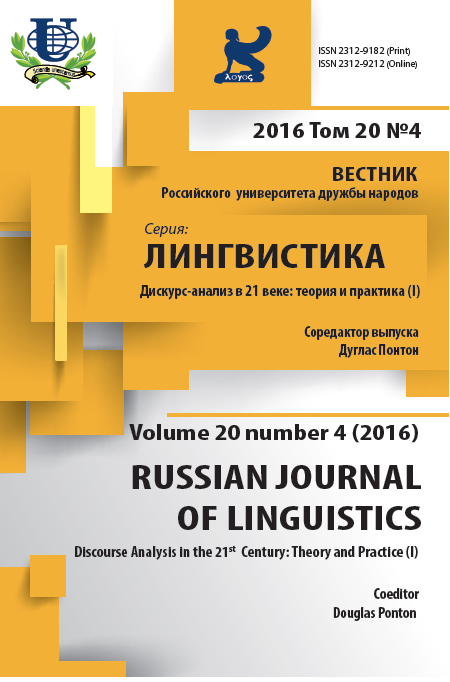Discourse, Statement and Speech Act
- Authors: Krasina E.A.1
-
Affiliations:
- Peoples’ Friendship University of Russia
- Issue: Vol 20, No 4 (2016): Discourse Analysis in the 21st Century: Theory and Practice (I)
- Pages: 91-102
- Section: Articles
- URL: https://journals.rudn.ru/linguistics/article/view/15150
- DOI: https://doi.org/10.22363/2687-0088-15150
- ID: 15150
Cite item
Full Text
Abstract
Being a component of socio-cultural interaction discourse constitutes a sophisticated cohesion of language form, meaning and performance, i.e. communicative event or act. Cohesion with event and performance let us treat discourse as a certain lifeform, appealing both to communicative interaction and pragmatic environment using the methodology of studies of E. Benveniste, M. Foucault, I. Kecskes, J.R. Searle et al. In linguistics and other fields of humanitarian knowledge the notion of discourse facilitates the integration of studies in humanities. Principles of integration, incorporation into broad humanitarian context reveal some topics of discourse-speech act-utterance interaction which leads to substantive solutions of a number of linguistic topics, in particular, that of an utterance. Logicians determine utterance through proposition; linguists - through sentence, while speech act theory does it by means of illocutionary act. Integrated in a discourse or its part, utterance makes up their integral constituents although not unique ones. In relation to speech acts, utterance happens to be the unique definitional domain synchronically modelling and denoting speech act by means of propositional content. The goal of the research is to show the conditions of interaction and correlation of discourse, speech act and utterance as linguistic constructions, reveal some similarities and differences of their characteristics and prove the importance of the constructive role of utterance as a minimal unit of speech production. Discourse-speech act-utterance correlation supports the utterance role of a discrete unit within syntactic continuum, facing both language and speech: still, it belongs exclusively neither to language nor speech, but specifies their interaction in course of speech activity exposing simultaneously its nature of an ‘atom of discourse’ and creating the definitional domain of a speech act.
About the authors
Elena Alexandrovna Krasina
Peoples’ Friendship University of Russia
Email: elena_krassina@mail.ru
6, Miklukho-Maklaya str., Moscow, 117198
References
- Апресян Ю.Д. Перформативы в грамматике и словаре // Апресян Ю.Д. Избранные труды. Т. II. М.: Школа «Языки русской культуры», 1995. С. 199-218
- Austin, J.R. (1962). How to do things with words. Oxford
- Бенвенист Э. Общая лингвистика. М.: Прогресс, 1974. 447 c
- Беднарова-Гибова K. (2015). О некоторых прагматических и когнитивных теориях применительно к литературному дискурсу // Вестник РУДН. Серия: Теория языка. Семиотика. Семантика, 2015. № 4. С. 61-70
- Бюиссанс Э. Язык и дискурс. URL: http://www.studfiles.ru/preview//1863762 (дата обращения 04.09.2016)
- Бюлер К. Теория языка. Репрезентативная функция языка. М.: Прогресс, 1993. 528 с
- Ван Дейк Т.А. Язык. Познание. Коммуникация. М.: Прогресс, 1989. 312 с
- Вежбицка А. Речевые акты // Новое в зарубежной лингвистике. М.: Прогресс, 1985. Вып. 16. С. 251-275
- Грайс П. Логика и речевое общение // Новое в зарубежной лингвистике. М.: Прогресс, 1985. Вып. 16. С. 217-237
- Зубкова Л.Г. Языковые единицы и категории в свете сущностных свойств языка и системные принципов // Языковые категории и единицы. Сб. научных статей: К 85-летию профессора А.Б. Копеолиовича. Владимир: Транзит-ИКС, 2014. С. 118-125
- Караулов Ю.Н., Петров В.В. От грамматики текста к когнитивной теории дискурса // Ван Дейк Т.А. Язык. Познание. Коммуникация. М., 1989. С. 5-11
- Кечкеш И. Слово, контекст и коммуникативное значение // Вестник РУДН. Серия: Лингвистика. 2014. № 1. С. 7-18
- Kecskes I., Zhang F. (2009). Activating, seeking, and creating common ground: A socio-cognitive approach // Pragmatics and cognition, 17 (2), 2009, 331-335
- Красина Е.А. Русские перформативы: Монография. М.: Изд-во РУДН, 1999. 126 с
- Крекич Й. Побудительные перформативные высказывания. Сегед, 1993. 241 с
- ЛЭС: Лингвистический энциклопедический словарь. М.: Советская энциклопедия, 1996
- Серль Дж.Р. Природа Интенциональных состояний // Философия, логика, язык. М.: Прогресс, 1983. С. 96-126
- Серль Дж.Р., Вандервекен Д. Основные понятия исчисления речевых актов // Новое в зарубежной лингвистике. М.: Прогресс, 1986. Вып. 18. С. 242-264
- Структура текста: сборник статей / Отв. ред. Т.В. Цивьян. М.: Наука, 1980. 284 с
- Фуко М. Археология знаний. Киев: Ника-Центр, 1996. 208 с
Supplementary files















